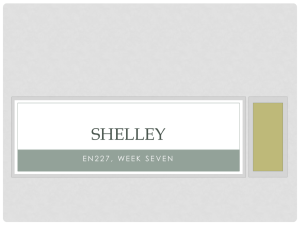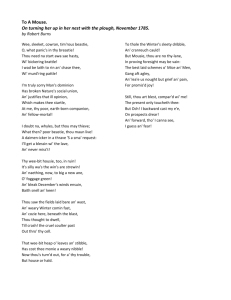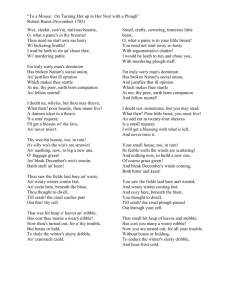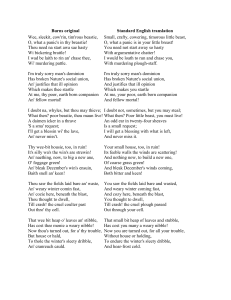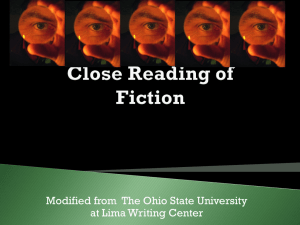To a Mouse - Duluth High School
advertisement
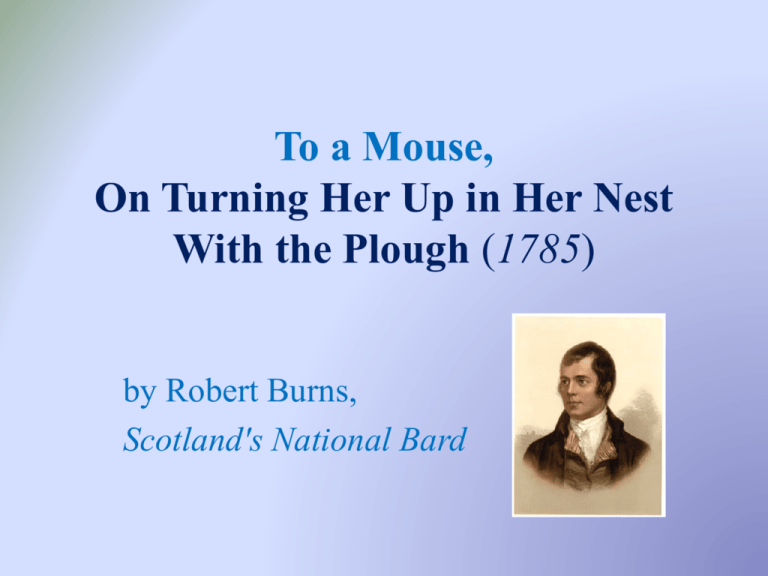
To a Mouse, On Turning Her Up in Her Nest With the Plough (1785) by Robert Burns, Scotland's National Bard Wee, sleekit, cowrin, tim'rous beastie, O, what a panic's in thy breastie! Thou need na start awa sae hasty Wi bickering brattle! I wad be laith to rin an' chase thee, Wi' murdering pattle. Small, sleek, cowering, timorous beast, O, what a panic is in your breast! You need not start away so hasty With hurrying scamper! I would be loath to run and chase you, With murdering plough-staff. I'm truly sorry man's dominion Has broken Nature's social union, An' justifies that ill opinion Which makes thee startle At me, thy poor, earth born companion An' fellow mortal! I'm truly sorry man's dominion Has broken Nature's social union, And justifies that ill opinion Which makes thee startle At me, thy poor, earth born companion And fellow mortal! I doubt na, whyles, but thou may thieve; What then? poor beastie, thou maun live! A daimen icker in a thrave 'S a sma' request; I'll get a blessin wi' the lave, An' never miss't. I doubt not, sometimes, but you may steal; What then? Poor beast, you must live! An odd ear in twenty-four sheaves Is a small request; I will get a blessing with what is left, And never miss it. Thy wee-bit housie, too, in ruin! It's silly wa's the win's are strewin! An' naething, now, to big a new ane, O' foggage green! An' bleak December's win's ensuin, Baith snell an' keen! Your small house, too, in ruin! It's feeble walls the winds are scattering! And nothing now, to build a new one, Of coarse grass green! And bleak December's winds coming, Both bitter and keen! Thou saw the fields laid bare an' waste, An' weary winter comin fast, An' cozie here, beneath the blast, Thou thought to dwell, Till crash! the cruel coulter past Out thro' thy cell. You saw the fields laid bare and wasted, And weary winter coming fast, And cozy here, beneath the blast, You thought to dwell, Till crash! the cruel plough past Out through your cell. That wee bit heap o' leaves an' stibble, Has cost thee monie a weary nibble! Now thou's turned out, for a' thy trouble, But house or hald, To thole the winter's sleety dribble, An' cranreuch cauld. That small bit heap of leaves and stubble, Has cost you many a weary nibble! Now you are turned out, for all your trouble, Without house or holding, To endure the winter's sleety dribble, And hoar-frost cold. But Mousie, thou art no thy lane, In proving foresight may be vain: The best laid schemes o' mice an' men Gang aft agley, An' lea'e us nought but grief an' pain, For promis'd joy! But Mouse, you are not alone, In proving foresight may be vain: The best laid schemes of mice and men Go often askew, And leaves us nothing but grief and pain, For promised joy! Still thou are blest, compared wi' me! The present only toucheth thee: But och! I backward cast my e'e, On prospects drear! An' forward, tho' I canna see, I guess an' fear! Still you are blest, compared with me! The present only touches you: But oh! I backward cast my eye, On prospects dreary! And forward, though I cannot see, I guess and fear! 1. Describe the narrator and his relationship to the mouse. 2. What are the Romantic elements of the poem? 3. How is this poem still relevant today? 4. Which modern organizations could utilize this poem for their cause? How? 5. The subtitle of the poem refers to the mouse as a female. Would the poem have less impact if it were about a male? Explain.
